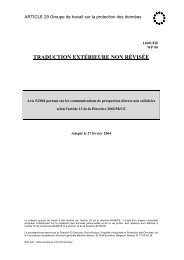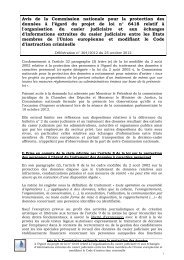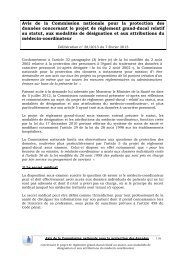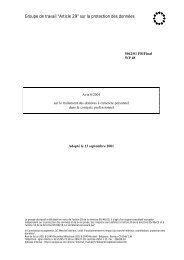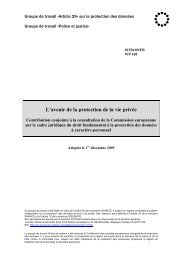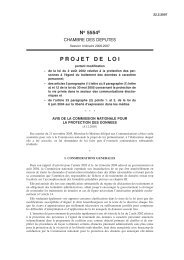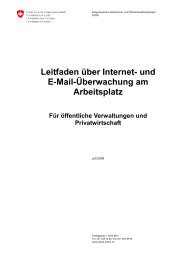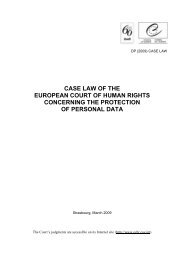case law of the european court of human rights concerning the ...
case law of the european court of human rights concerning the ...
case law of the european court of human rights concerning the ...
You also want an ePaper? Increase the reach of your titles
YUMPU automatically turns print PDFs into web optimized ePapers that Google loves.
expressly laid down in <strong>the</strong> <strong>case</strong> <strong>law</strong> at all. Above all, <strong>the</strong> system did not for <strong>the</strong> time being afford<br />
sufficient safeguards against various possible abuses. For example, <strong>the</strong> categories <strong>of</strong> people liable to<br />
have <strong>the</strong>ir telephones tapped by judicial order and <strong>the</strong> nature <strong>of</strong> <strong>the</strong> <strong>of</strong>fences which might give rise to<br />
such an order were nowhere defined. Nothing obliged a judge to set a limit on <strong>the</strong> duration <strong>of</strong><br />
telephone tapping. Similarly unspecified were <strong>the</strong> procedure for drawing up <strong>the</strong> summary reports<br />
containing intercepted conversations; <strong>the</strong> precautions to be taken in order to communicate <strong>the</strong><br />
recordings intact and in <strong>the</strong>ir entirety for possible inspection by <strong>the</strong> judge (who could hardly verify<br />
<strong>the</strong> number and length <strong>of</strong> <strong>the</strong> original tapes on <strong>the</strong> spot) and by <strong>the</strong> defence; and <strong>the</strong> circumstances in<br />
which recordings might be or had to be erased or <strong>the</strong> tapes be destroyed, in particular where an<br />
accused had been discharged by an investigating judge or acquitted by a <strong>court</strong>. The information<br />
provided by <strong>the</strong> Government on <strong>the</strong>se various points showed at best <strong>the</strong> existence <strong>of</strong> a practice, but a<br />
practice lacking <strong>the</strong> necessary regulatory control in <strong>the</strong> absence <strong>of</strong> legislation or <strong>case</strong> <strong>law</strong>.<br />
In short, French <strong>law</strong>, written and unwritten, did not indicate with reasonable clarity <strong>the</strong> scope and<br />
manner <strong>of</strong> exercise <strong>of</strong> <strong>the</strong> relevant discretion conferred on <strong>the</strong> public authorities. This was truer still<br />
at <strong>the</strong> material times, so that <strong>the</strong> applicants had not enjoyed <strong>the</strong> minimum degree <strong>of</strong> protection to<br />
which citizens were entitled under <strong>the</strong> rule <strong>of</strong> <strong>law</strong> in a democratic society. The Court <strong>the</strong>refore held<br />
that <strong>the</strong>re had been a breach <strong>of</strong> Article 8 <strong>of</strong> <strong>the</strong> Convention.<br />
[See paragraphs 32-36 <strong>of</strong> <strong>the</strong> Kruslin judgment and point 1 <strong>of</strong> its operative provisions; and<br />
paragraphs 31-35 <strong>of</strong> <strong>the</strong> Huvig judgment and point 1 <strong>of</strong> its operative provisions.]<br />
B. Purpose and necessity <strong>of</strong> <strong>the</strong> interference<br />
The Court, like <strong>the</strong> Commission, did not consider it necessary to review compliance with <strong>the</strong> o<strong>the</strong>r<br />
requirements <strong>of</strong> paragraph 2 <strong>of</strong> Article 8.<br />
[See paragraph 37 <strong>of</strong> <strong>the</strong> Kruslin judgment and paragraph 36 <strong>of</strong> Huvig judgment.]<br />
II. Article 50 <strong>of</strong> <strong>the</strong> Convention<br />
A. Kruslin <strong>case</strong><br />
The applicant claimed, firstly, compensation in <strong>the</strong> amount <strong>of</strong> 1,000,000 French francs (FRF) in<br />
respect <strong>of</strong> his fifteen-year prison sentence. He also sought reimbursement <strong>of</strong> FRF 70,000 in respect<br />
<strong>of</strong> <strong>law</strong>yer's fees and expenses in <strong>the</strong> national proceedings. He made no claim for <strong>the</strong> proceedings at<br />
Strasbourg, as <strong>the</strong> Commission and <strong>the</strong> Court had granted him legal aid. The Government and <strong>the</strong><br />
Delegate <strong>of</strong> <strong>the</strong> Commission expressed no opinion on <strong>the</strong> matter.<br />
The Court considered that <strong>the</strong> finding that <strong>the</strong>re been a breach <strong>of</strong> Article 8 afforded Mr Kruslin<br />
sufficient just satisfaction for <strong>the</strong> alleged damage and that it was accordingly unnecessary to award<br />
pecuniary compensation.<br />
[See paragraphs 38-39 <strong>of</strong> <strong>the</strong> judgment and point 2 <strong>of</strong> <strong>the</strong> operative provisions]<br />
As to <strong>the</strong> costs and expenses, <strong>the</strong>Court held that France was to pay <strong>the</strong> applicant <strong>the</strong> sum <strong>of</strong> FRF 20,000<br />
which he had sought in respect <strong>of</strong> one set <strong>of</strong> national proceedings. It dismissed <strong>the</strong> remainder <strong>of</strong> his<br />
claims.<br />
35



